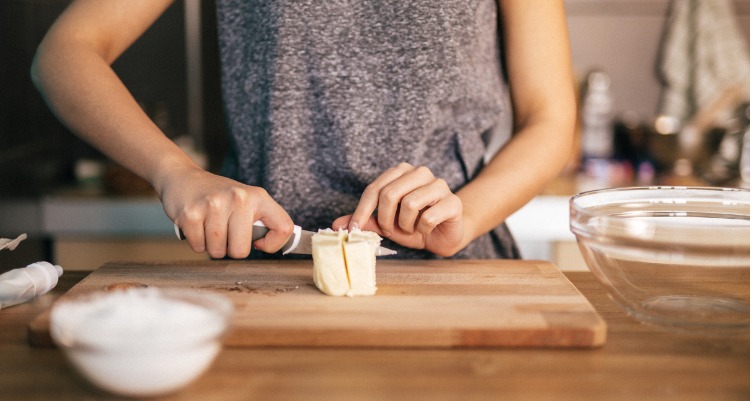Why Does Fat Make Food Taste So Good?

- Everything’s better with butter, and bacon and chocolate are just delicious. But what makes them taste so good?
- Studies show our taste buds have receptors for fat, but it may be our conditioning and what fat does to our gut that gives us the cravings.
- To understand what makes fat taste so good, read on for the science behind what it does to your body and mind.
Bacon, ice cream, a burger and fries — what exactly makes these foods taste so good? You know about sweet, salty, sour, bitter and umami, but can we actually taste fat? Read on for the science behind why we crave fatty foods.
Is fat a flavor we can taste?
We associate fatty foods like butter and chocolate with deliciousness, but is fat the same as our basic tastes of salt, sweet, sour, bitter and umami? Scientists have discovered that particular receptors on taste bud cells, named CD36 and G protein-coupled receptor (GPCR) 120, sense the taste of fat.[1]
When these receptors are activated by fat, neurotransmitters in the brain release compounds throughout the digestive tract which break down the fat into short-chain fatty acids and lipids that are absorbed by the body.
There are still doubts about whether we can actually “taste” fat the same way we can identify the sweetness of candy or the bitterness of dark chocolate. Until this debate is settled, it may take the flavor community some time to officially recognize fat as the sixth flavor.
Related: Is Fat Good for You?
Why do our brains crave fatty foods?
It might be our subconscious at work. For some people, the love of rich, fatty foods is all about conditioning, linking back to a place of emotional connection.
When you were a kid, were you given dessert each night as a reward for finishing your dinner? This could have generated a trained response over time, delivering a boost of pleasure-inducing dopamine every time you got a bowl of ice cream or piece of cake.[2] This leads us to crave fatty foods when we want a burst of pleasure, and when we eat a fatty dessert, our brains are flooded by dopamine.
Scientists have found that the power of these cravings is as strong as an addict’s urge for a drug. According to studies done at the Monell Chemical Senses Center and the University of Pennsylvania School of Medicine, functional magnetic resonance imaging (fMRI) showed that food cravings activate brain areas related to emotion, memory and reward — the same areas that are activated when addicts crave drugs.[3]
Once we eat fat, it also does a great job of satisfying our hunger. Read on to learn the science behind how that happens.
How do fatty foods make you feel full?
As humans evolved, we developed a preference for high-fat foods as a key to survival. The satisfaction of feeling full after a fatty meal helped us evolve to seek more fat.
There’s science behind what gives you this full feeling. You know how water and oil interact? Well, one of the reasons fat is satisfying and makes you feel less hungry is that your digestive tract is water-based. Water and fats like oil don’t mix, so your digestive tract has to slow down and use a whole different set of mechanisms to break down fats.[4]
Lipase is the key player in breaking down fatty acid bonds. It starts in the mouth, where the lipase in saliva breaks down some of the short-chain lipids into diglycerides.[5] This is the satisfying mouthfeel you get when a creamy sauce coats your tongue, or ice cream or chocolate melts in your mouth.
Fat takes longer to process, so as the food moves down your digestive tract into the small intestine, the speed at which food moves through your digestive tract, also called gastric motility, sloooooows down. Bile from the liver and more lipase coming from the pancreas enter the small intestine to break the fat down into smaller chains of fatty acids, then into lipids that can be absorbed into the blood.
When digestion slows down, your gut sends the message to your brain that you can stop eating. You feel satiated, not hungry. Once the fat has been absorbed by the body, digestion speeds back up again, and you’re ready for your next meal.
Use healthful fats to reduce cravings
Good news: You can use the power of fat metabolism to curb cravings.
Studies have shown that when participants ate a breakfast high in a type of fat called medium-chain triglycerides (MCTs), they ate less at lunch. When they consumed more MCTs at lunch, they also ate less for dinner.[6]
Bulletproof MCT Oils are keto-friendly and help stretch out periods between meals by reducing cravings and helping you stay satiated longer. MCT oils aren’t just a way to curb cravings — they also fuel your body without a crash and improve cognitive performance for a long-lasting brain boost. Not sure how to get more MCTs in your diet? Start with the Bulletproof Coffee recipe.
Read next: How to Stop Stress-Eating When You’re Home All Day
Sign up for early access to sales, product launches, the latest Bulletproof news and more!



